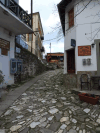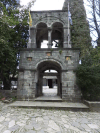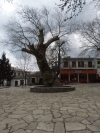
Street in Zagora. (960k)
From the Zagora, Greece entry in Wikipedia:
Zagora is a village and a former municipality on the Pelion peninsula in Magnesia, Thessaly, Greece.
Zagora is an important commercial and tourism center of Pilion with a rich history and cultural traditions. Zagora is a stopping point for those headed to the town of Pouri or to the nearby beaches of the Aegean Sea (Chorefto and Agia Saranta). The village has many fine examples of architecture typical of Pilion, including its churches and several notable archontika (mansions). Zagora is composed of four districts that correspond to its four main churches: Agios Georgios, Agia Kyriaki, Agia Paraskevi (or Perachora) and Metamorphosis (or Sotira).
From findings of the area (Greek ruins, coins of the Pagas, etc.) it seems that it has been inhabited since the Homeric era. First mentions of the settlement under its current name come from the 13th century. In the 14th century Magnesia came under the control of the Republic of Venice and the Catalans
The Venetian and Catalonian connections proved to be fruitful for the Zagorians. A large fleet was constructed in Zagora's port, Chorefto, and extensive trade of silk begun. The Zagorian galleys reached as far as West Africa and Scandinavia.
During the Ottoman occupation, the area was given privileges during the reign of Sultan Mehmet IV, the most important of which was that Turks should not live permanently in the area. Agriculture and trade flourished, while local handicrafts of woolen fabrics and silk flourished until the middle of the 19th century. Wealthy Zagorian merchants settled in many cities abroad. Those who remained in the village maintained branches and representatives in important trade centers of the time (in Moldavia, Russia, etc.). The financial strength and the constant communication with the outside created the ground for the intellectual development and prosperity of Zagora.
In the middle of the 1850s (during 1853 or 1855) the Kassavetio Girl's School started operating, which was the first girls' school founded in Ottoman Thessaly. Later, in the revolution of Pelion in January 1878 (part of the wider Greek revolutions in the Ottoman territory), Zagora was the seat of the revolutionary government of the insurgent regions whose president was elected Jerome Kassavetis. Although that revolution was suppressed, on the initiative of England, it resulted in the concession of Thessaly to Greece by the Treaty of Berlin of 1878.
In 1938, the road connecting Zagora to Volos was completed. During the Axis Occupation of Greece, in January 1943, the Italian commander of Volos, Luigi Giala, ordered the bombing of Zagora from Horefto after an Italian sergeant was killed in a clash with guerrillas near Zagora. Italian forces then raided the town, looting it, leading to mass arrests and sporadic killings. Later some of the prisoners were executed, while, in mid-February of the same year, the inhabitants were forced to evacuate Zagora, to which they returned after about a month.
All pictures are © Dr. Günther Eichhorn, unless otherwise noted.










This page contains 10 pictures
Here are the links to the other main pages on Greece:
Page last updated on Fri Jul 1 13:19:24 2022 (Mountain Standard Time)
Page last updated on Sat May 18 08:31:33 2024 (Mountain Standard Time)